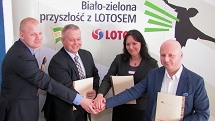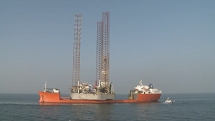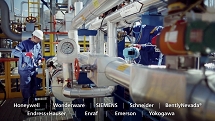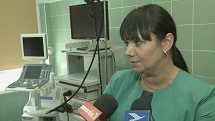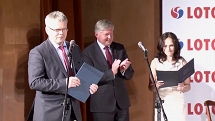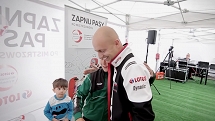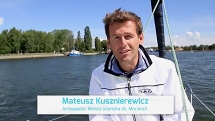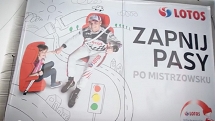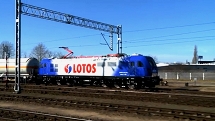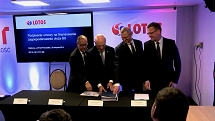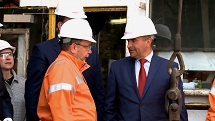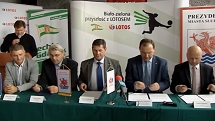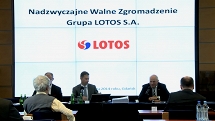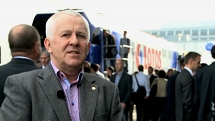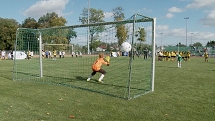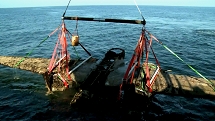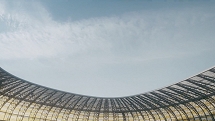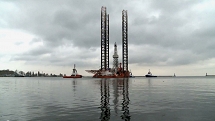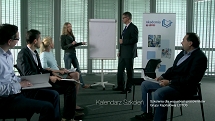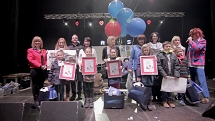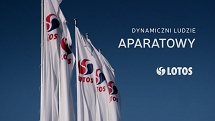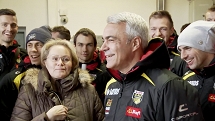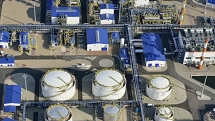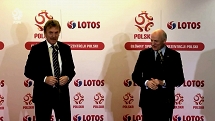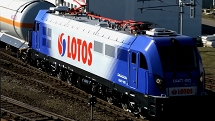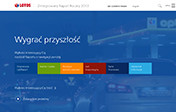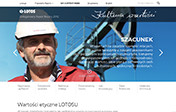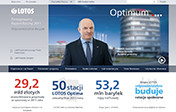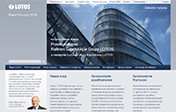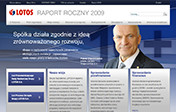-
Financial information
The past year ushered in a series of challenges for the companies in the fuel sector. The decisions made by us have demonstrated that we are able to take rapid steps to adapt to a demanding environment and ensure the desired profitability for our projects.
-
Segment performance
The segmental management model we have implemented enhances management efficiency, delivering cost and revenue synergies across the organization.
-
Letter from the Vice-President of the Board
2014 ushered in a series of challenges for the companies in the fuel sector. The decisions made by the LOTOS Group have demonstrated that we are able to take rapid steps to adapt to a demanding environment and ensure the desired profitability for our projects.
-
Business environment
The key factor that had a strong impact on both the global and Polish petroleum markets in 2014, with significant consequences for the LOTOS Group’s performance, was the price of crude oil, which also determined the price of petroleum products.
-
Strategic objectives
The LOTOS Group’s Strategy is designed to strengthen our position as a strong, innovative and efficient business which plays a major role in ensuring national energy security.
-
Business model
Our operations consist in crude oil production and processing, as well as wholesale and retail sale of petroleum products, among which are: fuels (unleaded gasoline, diesel oil and light fuel oil), heavy fuel oil, bitumens, aviation fuel, naphtha, propane-butane LPG and base oils.
-
Risk and opportunities
At the LOTOS Group, we identify a range of diverse risks, which may affect all areas of our business. The key risks in terms of their impact on our operations are the financial risks as well as risks affecting the exploration and production area. In the analysis of the risks, we also factor in issues related to sustainable development.
-
Key data 2014
With revenue of ca. PLN 28.5bn in 2014, we rank fourth in the group of 500 largest businesses in Poland.

Strategic objectives
The overriding strategic objective of the LOTOS Group is to create value for shareholders through optimised deployment of human and material resources and implementation of development programmes in exploration and production, processing and marketing. These programmes are pursued in compliance with the principles of sustainable growth.
The operational priorities and development directions for the LOTOS Group until 2020 are set forth in the strategy for 2011–2015.
Exploration and production
In the exploration and production area, the LOTOS Group is intensifying its efforts to expand the resource base in order to take advantage of the high margins projected for this sector in the long term.
Strategic objectives:
- Increase production of hydrocarbons in line with the priorities of Poland’s energy policy until 2030,
- Increase the production potential to 24 thousand boe (barrel of oil equivalent) daily (or 1.2m tonnes of crude oil annually) in 2015.
The activities undertaken to meet these objectives are based on a continuous expansion of operations in the Baltic Sea, the Norwegian Continental Shelf and onshore areas in Poland and Lithuania, in particular by:
Poland:
- Increasing production from the existing fields,
- Fully appraising hydrocarbon potential of the Baltic Sea assets,
- Expanding onshore activities.
Norway:
- Exploring, developing and producing from the existing offshore licence areas,
- Acquiring new producing fields.
Lithuania:
- Developing the existing onshore licence areas.
Processing operations
As part of processing operations the LOTOS Group focuses on effective utilisation of the Gdańsk refinery’s processing capacities. Growth-oriented activities are also undertaken to further enhance the refinery’s efficiency and benefit from possible synergies with the Polish petrochemical industry.
Strategic objectives:
- Achieve world-class standards of production and maintain strong competitive position among European refineries,
- Make optimum use of assets held and acquired as part of the growth strategy,
- Ensure safe and stable operation of production and ancillary facilities, with a target of 98% minimum annual availability,
- Further increase the conversion ratio and intensify feedstock processing.
The overriding strategic objective is effective utilisation of the Gdańsk refinery’s capacities.
Marketing operations
The LOTOS Group’s strategy for its marketing operations assumes that all marketing activities should lead to improvement of the integrated margin and ultimately translate into higher shareholder value.
The strategic objectives are being pursued in many areas of operations.
- As regards fuel sales, the key objective is to further reinforce market presence and the key goals here are to:
- Maintain a 30% share in the domestic fuel market,
- Achieve sales 15% in excess of the fuel production capacities of the Grupa LOTOS refinery,
- Secure a 10% share in the domestic retail market through development of the service station chain and enhanced sales from the existing chain.
- In sales of lubricating oils, the key objective is to retain our leading position on the domestic market.
- In sales of other products, the key objective is to optimise financial performance by leveraging our resources and market conditions.
The achievement of the above strategic objectives will be possible only with optimum management of the supply chain, including planning, procurement, production and distribution. Moreover, given its large processing capacities the LOTOS Group is continuing its policy of diversifying directions and sources of crude oil supplies.
Key areas of focus and development for the LOTOS Group until 2020:
- Further optimisation of the management model to achieve the highest available efficiency.
- Access to proven recoverable reserves of hydrocarbons of approximately 330m boe in 2020.
- Production growth to approximately 110 thousand boe/day (equivalent of 5m tonnes of crude a year).
- Maintaining at least 30% share in the domestic fuel market.
- Maintaining fuel sales 15% above the refinery’s fuel production capacity.
- Maintaining at least 10% share in the domestic retail fuel market.
- Further improvement of the economic efficiency of crude processing, ensuring full utilisation of the assets.
- Steps to optimise energy management at the refinery by expanding connections with other power systems.
Our growth-oriented activities and efficiency improvement projects implemented in identified areas are geared towards increasing the LOTOS Group’s value through innovative and sustainable development, with due regard to the principles and values supported by our stakeholders.
EFRA (Effective Refining)
One of the LOTOS Group’s key investment projects undertaken with a view to achieving the objectives of its strategy for 2011−2015 and growth directions until 2020 is the EFRA Project.
Under the project, LOTOS Asfalt and Grupa LOTOS plan to construct a delayed coking unit with auxiliary infrastructure at the refinery, which would make it possible to convert the refinery’s heavy residue output into final products for which there is a strong demand on the market, such as diesel oil, LPG and pyrolysis gasoline. As a result, the share of low-margin bitumens and heavy fuel oils produced from heavy residue in the total output would be reduced or even eliminated, while the share of high-margin final products would increase, adding 900,000 tonnes of high-margin products per annum.
In 2014, preparatory work under the EFRA Project was well advanced, both in the area of financing and awarding contracts for unit construction. A positive environmental decision was received, and a procedure to select contractors for the key units was completed. Final completion of the project and commissioning is planned for 2018.
STATEMENT
In the near future, LOTOS Asfalt will play a vital role in the LOTOS Group’s development plans. In addition to its current operations − bitumen production and sales − the company will be responsible for another crucial endeavour, namely the Effective Refining (EFRA) Project, designed to further modernise the Grupa LOTOS refinery in Gdańsk.
Piotr Przyborowski
President of the Management Board of LOTOS Asfalt
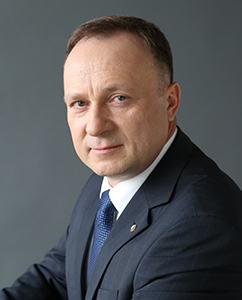
Given its technological structure, EFRA is highly consistent with LOTOS Asfalt’s scope of operations. The project will enable more efficient and flexible use of heavy residue for production of bitumens or coking, which will help the company adjust to changing market conditions. For the LOTOS Group, it represents a natural and reasonable direction of sustainable and secure development.
EFRA will be carried out jointly by Grupa LOTOS and LOTOS Asfalt, acting as the main project owner. Following the project’s completion in 2018, LOTOS Asfalt will be able to process vacuum residue and add liquid fuels to its product mix.
The company will still produce bitumens, but only in economically justified quantities meeting the current demand. The project will drive up LOTOS Asfalt’s profits by reducing the seasonality effect related to bitumen sales, which reflect the cyclical nature of road construction works. EFRA is a great challenge for our company, requiring its reorganization and a wholly new strategy.
The Project, unprecedented on the Polish market, is a chance for the LOTOS Group to gain a technological edge. EFRA covers a number of key units, including the Delayed Coking Unit (DCU), the Coking Naphtha Hydrotreating Unit (CNHT), the Hydrogen Generation Unit (HGU) and the HCB Vacuum Distillation Unit (HVDU – at Grupa LOTOS). Total annual output of the project units will be approximately 800 thousand tonnes of fuels and 350 thousand tonnes of coke. Following EFRA’s implementation, the LOTOS Group will phase out the production of heavy fuel oil.
STATEMENT
The name EFRA (Effective Refining) refers to the project being currently implemented by the LOTOS Group which uses the delayed coking technology. Delayed coking is an effective refining technology which will enable deeper conversion of crude oil at our refinery, maximising the volume of high-margin products produced in our refinery, such as diesel oil and aviation fuel while reducing the output of low-margin products such as bitumens and heavy fuel oils.
Grzegorz Hrycyna
Investment Project Director, Grupa LOTOS
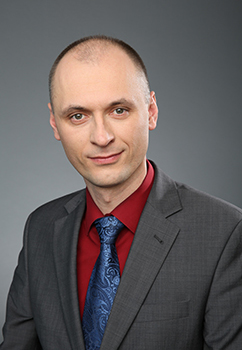
The processing configuration of the refining units will allow for flexible optimization of production depending on the current market prices of raw materials and products – from discontinuing the production of heavy products altogether when the margins are low, up to producing substantial amounts of bitumen when customers willing to pay attractive prices place their orders.
While estimating the rate of return on our investment, we assumed cautiously that most streams of refinery products manufactured by the EFRA Project will be placed on international markets, which are more liquid than the Polish market. The location of the refinery in Gdańsk allows us to effect deliveries within the region of the Baltic Sea and Western Europe. However, given the right demand for fuels in Poland, there will not be any obstacles to place these products on the domestic market. The investment will therefore improve the organization’s competitive position and allow it to secure a long-term foothold on the increasingly challenging fuel market in Europe, which must face growing pressures from refineries in the US, the Middle East and Russia.
The Project’s key advantage is its ability to utilise the MHC capacities developed as part of the 10+ Programme. Consequently, our capital expenditure will be lower than that incurred by other refineries embarking on similar projects. As the project has been adapted to perfectly fit the refinery’s existing infrastructure, only minor adjustments will be required to connect the new units.
The Project is also economically attractive, as confirmed by lending institutions, the owner and stock-exchange investors, who decided to acquire Grupa LOTOS new shares in 2014. Last but not least, the project will be based on tested and often innovative process licences developed by renowned companies, and the state-of-the-art solutions (e.g. hermetically sealed coke off take) will help us mitigate the environmental impact of Grupa LOTOS refinery.
EFRA Project will be carried out by an experienced team of experts which has successfully managed Grupa LOTOS’ investment projects since the 1990s, including the recent 10+ Programme. For Grupa LOTOS and LOTOS Asfalt, the next three years will be a period of intensive work. We are prepared to handle the increased workload in terms of both technical and organizational resources. Initial and integration designs have all been completed, and we have the relevant personnel and a project schedule ready to be implemented.
Our objective is to deliver the project in such a way as to secure added value for the LOTOS Group and its key stakeholders, while also maintaining our ability to meet credit facility repayments. To ensure that this happens, we need to design and construct the project units so as to ensure their safe, efficient and flexible operation. The LOTOS Group is more than ready to handle this challenge.







